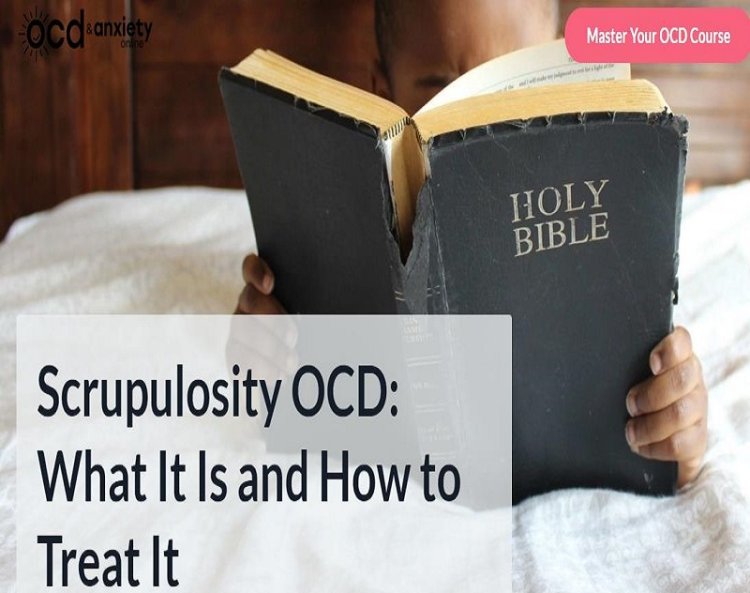Understanding Scrupulosity OCD: Exploring Moral OCD and Moral Scrupulosity
OCD-Anxiety.com is a trusted online resource offering invaluable insights and support for those navigating the challenging landscape of Obsessive-Compulsive Disorder (OCD) and anxiety-related conditions. With expertly curated content, practical coping strategies, and user-friendly tools, the platform empowers individuals to understand their conditions better and take control of their mental health. From informative articles to a compassionate community forum, OCD-Anxiety.com serves as a beacon of hope, fostering understanding and fostering a sense of belonging on the journey to recovery.
Share this Post to earn Money ( Upto ₹100 per 1000 Views )

Obsessive-Compulsive Disorder (OCD) is a mental health condition characterized by persistent, unwanted thoughts (obsessions) and repetitive behaviors (compulsions) aimed at reducing the distress caused by these thoughts. One of the lesser-known but equally debilitating forms of OCD is scrupulosity OCD, also known as moral OCD or moral scrupulosity. This article delves into the intricacies of scrupulosity OCD, exploring its manifestations and impact on individuals.
Scrupulosity OCD is a subtype of OCD where individuals are plagued by intrusive thoughts related to moral or religious issues. These thoughts often center around a fear of being immoral, sinful, or ethically wrong. People with scrupulosity OCD might obsess over whether their actions, thoughts, or even their intentions align with their moral or religious values.
Moral OCD, another term for scrupulosity OCD, highlights the intense struggle individuals face with maintaining ethical perfection. Those affected by moral OCD are consumed by the fear of acting immorally or violating their moral principles. This can lead to excessive self-scrutiny, constant questioning of their own integrity, and a relentless pursuit of moral certainty. Everyday decisions, interactions, and even passing thoughts can become sources of immense anxiety as individuals worry about the moral implications of their actions.
Moral scrupulosity is a specific aspect of scrupulosity OCD where individuals are tormented by doubts about their moral purity. They may engage in repetitive behaviors or mental rituals to alleviate the distress caused by these doubts. For instance, someone with moral scrupulosity might repeatedly confess their perceived wrongdoings, seek reassurance from others about their moral standing, or avoid situations that could potentially trigger their moral anxieties.
The term "what OCD" might be used by some to question or seek clarity about different aspects of OCD, including scrupulosity OCD. Understanding OCD in its various forms is crucial for recognizing the unique challenges faced by individuals with this condition. Scrupulosity OCD, with its focus on moral and religious concerns, underscores the diverse ways in which OCD can manifest and impact people's lives.
The Impact of Scrupulosity OCD
Scrupulosity OCD can have a profound impact on an individual's daily life. The constant need for reassurance, the fear of moral failure, and the compulsive behaviors aimed at achieving moral certainty can be exhausting and isolating. It can affect relationships, work, and overall quality of life. Moreover, the guilt and shame associated with moral OCD can lead to significant emotional distress and even depression.
Seeking Help and Treatment
It's important for individuals with scrupulosity OCD to seek professional help. Cognitive-Behavioral Therapy (CBT), particularly Exposure and Response Prevention (ERP), has been shown to be effective in treating OCD, including scrupulosity OCD. In ERP, individuals are gradually exposed to their fears and learn to resist the urge to perform compulsive behaviors. This helps in breaking the cycle of obsessions and compulsions, leading to a reduction in anxiety and an improvement in overall functioning.
In conclusion, scrupulosity OCD, or moral OCD, is a challenging form of OCD that revolves around fears of moral and religious transgressions. Understanding its nuances and seeking appropriate treatment can help individuals manage their symptoms and lead a more fulfilling life. Recognizing the impact of moral scrupulosity is crucial for providing the support and compassion needed by those affected by this condition.






